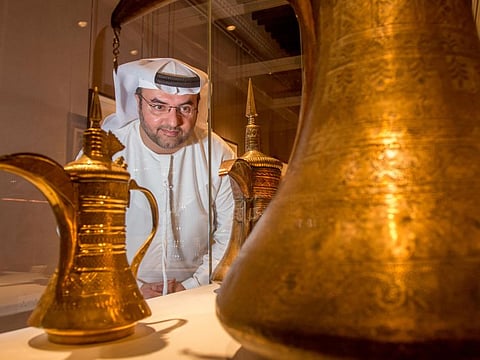Coffee comes home with new exhibition in Sharjah
Surprises are in store for those who thought beverage hailed from Italy or Colombia

Dubai: If you thought the word Mocha originated from South America or Italy, sit down now.
In fact the name of your favourite coffee doesn’t come from the foothills of Colombia or the streets of Rome, but from a port in Yemen called Mocha, where coffee beans were shipped in from Ethiopia, as early as the 12th Century.
Here they were roasted, ground and made into a drink for the first time by Sufi Muslims who drank endless cups in order to stay awake during their rituals.
Yes, coffee is as Arab as camels and sand, and despite the fact many people may still see it as a drink more synonymous with Europe, it didn’t reach there until at least a 100 years later.
From the Gulf it spread to Egypt and into Turkey where the Ottomans took it as far as Vienna before pulling back because of the cold weather. The Dutch then stole the plant and introduced it to the Caribbean and Latin America.
Once coffee found a foothold in Europe however, the Pope banned it because it was deemed an Islamic drink.
Coffeehouses in Egypt were also banned by the authorities there in the 16th Century because the drink drew groups together, who would invariably start discussing politics over their brew, making these establishments like an early form of twitter or facebook.
All this and more came out of our trip this week to the ‘Coffee in the Arabian Gulf’ exhibition at Sharjah Heritage Museum, which runs until December 2.
Exhibition curator Khalid Al Mullah, who is also the founder of the Dubai Coffee Museum, said, “When we started the museum reports said that coffee had come back to its birth, so it’s nice to bring back our history with this exhibition.”
How is he so sure that the above all started from Arabia as early as the 12th Century?
“About six years ago archaeologists found two roasted coffee beans in Ras Al Khaimah dating back from that era that had originated from Yemen. Not much is known about this discovery publicly but we plan to announce when and where it was found soon and put them on display.”
Included in Unesco’s tangible cultural heritage list in 2015, Arabia being the home of coffee is now beyond doubt.
“Coffee is hugely important to us socially, politically and economically,” added Al Mullah, who attributed its spread across the world as imperative to trade and relations, ultimately bringing Arabia into the world well before oil.
“Dubai is now the fifth biggest re-exporter of coffee in the world. So it has a great impact as we all know it’s one of the strongest commodities and the most consumed drinks after water.
“The Dallah (Arabian Coffee Pot) is also a symbol of our heritage that you will find on everything from our one dirham coins to our roundabouts, it’s a welcome that shows that even if somebody doesn’t have anything in their pocket, the least they can do is serve you coffee and dates.
“This has travelled hundreds of years and now we see it in modern life, from our ancestors to government departments and five star hotels.
“It’s so deep rooted in our culture that before anything we start with coffee as a simple sign of our Arab hospitality.”
Several different types of Dallah are on display at the museum, and we learnt that they don’t just change design depending on where in Arabia your hosts are from, but also depending on what tribe and family they are from, making your coffee experience uniquely personalised.
“Even the stones used to grind the coffee had the family’s signature on to stop people from stealing, so Dallahs really were the earliest form of a trademark.”
Coffee etiquette
At the exhibition there is also a workshop to familiarise you with the correct protocol at a coffee serving.
The person serving you coffee will either start with the person nearest to their right or with the most respected person in the room. They will hold the Dallah with their left hand and the finjan (cup) with their right. The coffee serving will only be one or two sips to encourage guests to ask for more and thus stay longer. The server then refills whenever the finjan is empty until the drinker signals to stop serving by shaking the finjan from side to side.


